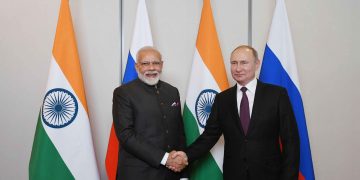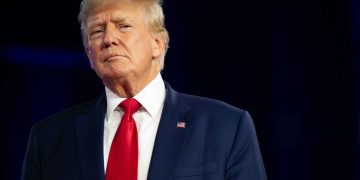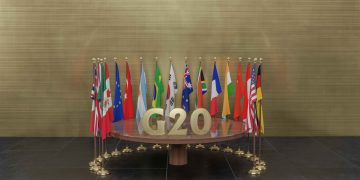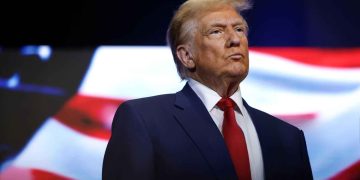Brics Challenges Western-Led World Order: A New Era of Multipolarity
In a world increasingly defined by its fractures, this week’s gathering of emerging nations in Russia came at a pivotal time in global geopolitics. The BRICS bloc—now expanded to include nine countries—seeks to redefine the rules of engagement, raising questions about global security and the quest for a more equitable world order. The allure of BRICS, which originally comprised Brazil, Russia, India, China, and South Africa, lies not just in its economic potential but in its challenge to the Western-dominated status quo.
Emerging Nations Unite: The Expanding Brics Bloc
At the summit from Tuesday to Thursday, the bloc welcomed Egypt, Ethiopia, Iran, and the United Arab Emirates as member states for the first time. Saudi Arabia has yet to officially join, but is closely involved with the group. A host of other countries, including Indonesia, Malaysia, Sri Lanka, and Myanmar, have formally submitted, or are considering, applications for membership. Analysts caution that the West, particularly the United States, should not attempt to dissuade nations from joining the bloc. Instead, they argue for a more constructive approach that addresses the grievances driving these countries toward a search for alternatives.
Navigating Global Geopolitics: Brics as an Alternative
Any attempt to sway nations away from BRICS is likely to backfire, according to Sarang Shidore, director of the Global South program at the Quincy Institute, a Washington-based think tank. Western nations should examine where they are falling short on their policies, especially toward the Global South—referring to developing nations with lower economic and social development. Shidore advocates for a reinvigoration of US-backed international institutions such as the United Nations and World Trade Organization, which have been increasingly sidelined amid rising tensions.
U.S. and Western Response: Addressing Grievances, Not Dissuasion
With BRICS now accounting for 45 percent of the world’s population and over one-third of the global economy, further expansion could herald a shift in the Western-led world order. Yet this growth complicates the bloc’s identity, as Jagannath Panda, head of the Institute for Security and Development Policy’s Stockholm Centre for South Asian and Indo-Pacific Affairs, notes. Brics is transforming from a group of emerging economies to include developed and “not-so-emerging economies,” creating “a geopolitical ring with the lead of China and the strong support of Russia … to challenge the American-led Western order.”
Identity Crisis: The Evolution of Brics
“The expansion of BRICS suggests that the divide between the West and the rest is only going to expand,” Panda cautions, warning that the bloc’s growth could lead to divisions in global governance. Meanwhile, U.S. allies such as Japan appear increasingly uneasy as more Southeast Asian nations express interest in joining BRICS. Analysts suggest that countries like Malaysia and Thailand, known for their balanced diplomatic stances, may be drifting away from their neutral positions.
The Implications for Southeast Asia: A Shift Towards Multipolarity
The involvement of 36 countries, including 20 heads of state, at this week’s BRICS summit in Kazan marked it as “the largest foreign policy event ever held” on Russian soil, according to Yuri Ushakov, an aide to President Vladimir Putin. Putin himself lauded Russia-China cooperation as “one of the main stabilizing factors” in global affairs during a face-to-face meeting with Chinese President Xi Jinping.
Russia and China: Strengthening Ties Amid Global Tensions
Both leaders emphasized the need to work together to ensure global security and promote a fairer world order. Xi highlighted that “the world is undergoing a major change that has not been seen in a century,” calling for urgent reform of the international financial architecture and urging Brics nations to lead the way. The summit’s 43-page final communique outlined various projects to facilitate trade between Brics nations, including an alternative payment system to the U.S. dollar, albeit lacking specifics or timelines.
The Call for Reform: Rethinking Global Governance
While the final statement addressed pressing global issues, including geopolitics and artificial intelligence, its mention of Ukraine was limited, only noting “with appreciation relevant proposals of mediation” aimed at a peaceful resolution of the conflict. The strongest language was reserved for the Middle East, calling for an immediate ceasefire in Gaza and denouncing Israeli “attacks against humanitarian operations, facilities, personnel, and distribution points.”
The Race for Influence: Brics Expansion and Global Dynamics
Russia and China are keen to solidify relationships in Asia, Africa, and Latin America. Ja Ian Chong, an associate political science professor at the National University of Singapore, notes that both countries navigate geopolitical pressures and sanctions from the U.S. and its allies. Moscow faces wide-ranging economic sanctions following its invasion of Ukraine, while Beijing claims that Washington seeks to “contain, encircle, and suppress” it. Such ties enable them to obtain key minerals and access markets.
China’s Strategic Objectives: Reducing Dollar Dependence
Recent seismic shifts in the geopolitical landscape, such as Russia’s invasion of Ukraine and intensifying U.S.-China rivalry, have fueled “a surge of interest among Global South states” in joining Brics, says Shidore. Many in the Global South view these developments as a sign of the existing world order’s disintegration, prompting fears of a looming systemic crisis. “As the lead manager of the global system, the U.S. begins to fail, states lose confidence in this leadership,” Shidore explains.
Future Prospects: What Lies Ahead for Brics?
Southeast Asia’s renewed interest in BRICS reflects a broader shift towards multipolarity, according to Anu Anwar, a non-resident associate at Harvard University’s Fairbank Centre for Chinese Studies. Nations in the region see BRICS as a platform to balance relationships, diversify economic ties, and amplify their voices in global governance. The bloc’s emphasis on “South-South cooperation” and financial independence, particularly through the New Development Bank, enhances its attractiveness.
To counter the momentum of countries flocking to the bloc, Anwar argues that the West must confront the underlying grievances, including frustrations over exclusion from global decision-making processes. A fairer redistribution of power and reforms in institutions such as the UN, World Bank, and International Monetary Fund are essential.
Conclusion
In the aftermath of Russia’s invasion of Ukraine, aligning with a bloc led by Moscow might have seemed risky for U.S. allies like Thailand and the UAE. However, as the conflict evolves, U.S. calls for solidarity with Ukraine have lost some potency, particularly amid the ongoing war in Gaza. Geoffrey Miller, a geopolitical analyst from Victoria University of Wellington, emphasizes that any group that includes both China and India “deserves to be taken seriously.” He notes, “For the U.S. and its allies, the lesson of the Brics expansion has to be that the race is on.”
Rather than undermining the bloc, Miller suggests the West should focus on providing meaningful alternatives. Initiatives like APEC and the G20—groups that include pivotal Brics members—could serve as collaboration platforms. Washington must also ensure that initiatives like the Indo-Pacific Economic Framework are “more about substance than rhetoric,” criticizing past protectionist stances.
Looking Ahead: The Future of Brics
Growing interest in BRICS is tied to India’s rising stature as an autonomous geopolitical player. Brian Wong, a geopolitical strategist and assistant professor at the University of Hong Kong, highlights India’s recent diplomatic maneuvers, particularly its responses to tensions with Canada and its ability to navigate the Ukraine conflict.
During the BRICS summit, Putin revealed that over 30 states expressed interest in joining, stressing the need for balance in any expansion. While there is no fixed timeline for admitting new members, Shidore notes that the consensus-based decision-making process of BRICS would inevitably slow down as the group grows. However, a larger BRICS could also be more influential, though it might dilute the dominance of China and Russia as each member prioritizes its interests.
The bloc’s true geopolitical power depends on “the strategic alignment and leadership of its most powerful members,” says Anwar. For Brics to evolve into a significant entity capable of shaping the global order, it must develop a unified threat perception and a coherent alternative vision of world order, both currently absent. As Wong cautions, all existing members, including China and Russia, must be mindful of the perils of an overexpanded and insufficiently coherent Brics.
Through Brics and its expansion, China aims to reinforce ties with the Global South and diminish global reliance on the U.S. dollar while promoting the use of its currency. The intent is to polarize the world and maintain connections with Eurasian powers like China and Russia, although this ambition faces limitations due to China’s image in much of the Global South.
As Putin urged Brics nations to collaborate on overhauling the global financial system and ending U.S. dollar dominance, the practicality of achieving an alternative payment system or de-dollarization remains uncertain. Nonetheless, Miller asserts that the annual Brics summit serves a valuable purpose, enhancing the bloc’s relevance as a forum for the Global South.





















